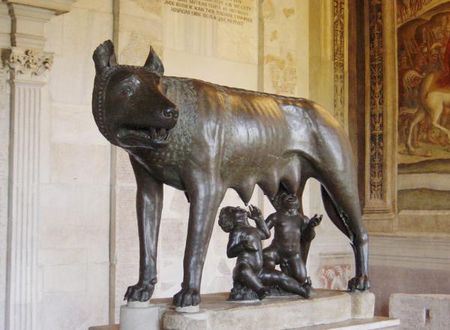Parilia
Home | Latíné | Deutsch | Español | Français | Italiano | Magyar | Português | Română | Русский | English
⚜⚜⚜ Site Index - Key Pages ⚜⚜⚜
The Foundation day of Rome on the 21st of April.
Parilia or Palilia, a festival celebrated at Rome every year on the 21st of April, in honour of Pales, the tutelary divinity of shepherds. Some of the ancient writers called this festival Parilia, deriving the name from pario, because sacrifices were offered on that day pro partu pecoris (Festus, s.v. Pales; compare Popularia sacra; Varr. de Ling. Lat. VI.15; Dionys. I.88).
The 21st of April was the day on which, according to the early traditions of Rome, Romulus had commenced the building of the city, so that the festival was at the same time solemnized as the dies natalicius of Rome (Festus, p850s.v. Parilibus; Cic. de Divin. II.47; Varro, de Re Rust. II.1; Plin. H. N. XVIII.66); and some of the rites customary in later times were said to have been first performed by Romulus when he fixed the pomoerium (Dionys. l.c.). Ovid (Fast. IV.721, &c.) gives a description of the rites of the Palilia, which clearly shows that he regarded it as a shepherd-festival, such as it must originally have been when the Romans were real shepherds and husbandmen, and as it must have continued to be among country-people in his own time, as is expressly stated by Dionysius; for in the city itself it must have lost its original character, and have been regarded only as the dies natalicius of Rome. The connection, however, between these two characters of the festival is manifest, as the founders of the city were, as it were, the kings of shepherds, and the founders of a religion suited to shepherds.
The first part of the solemnities, as described by Ovid, was a public purification by fire and smoke. The things burnt in order to produce this purifying smoke were the blood of the October-horse, the ashes of the calves sacrificed at the festival of Ceres, and the shells of beans. The people were also sprinkled with water; they washed their hands in spring-water, and drank milk mixed with must (Ovid, Fast. l.c.; compare Propert. IV.1.20). As regards the October-horse (equus October) it must be observed that in early times no bloody sacrifice was allowed to be offered at the Palilia, and the blood of the October-horse, mentioned above, was the blood which had dropped from the tail of the horse sacrificed in the month of October to Mars in the Campus Martius. This blood was preserved by the Vestal virgins in the temple of Vesta for the purpose of being used at the Palilia (Solin. p2D; Festus, s.v. October equus; Plut. Romul. 12). When towards the evening the shepherds had fed their flocks, laurel-branches were used as brooms for cleaning the stables, and for sprinkling water through them, and lastly the stables were adorned with laurel-boughs. Hereupon the shepherds burnt sulphur, rosemary, fir-wood, and incense, and made the smoke pass through the stables to purify them; the flocks themselves were likewise purified by this smoke. The sacrifices which were offered on this day consisted of cakes, millet, milk, and other kinds of eatables. The shepherds then offered a prayer to Pales. After these solemn rites were over, the cheerful part of the festival began: bonfires were made of heaps of hay and straw, and under the sounds of cymbals and flutes the sheep were again purified by being compelled to run three times through the fire, and the shepherds themselves did the same. The festival was concluded by a feast in the open air, at which the people sat or lay upon benches of turf, and drank plentifully (Tibull. II.5.87, &c.; compare Propert. IV.4.75).
In the city of Rome the festival must, at least in later times, have been celebrated in a different manner; its character of a shepherd-festival was forgotten, and it was merely looked upon as the day on which Rome had been built, and was celebrated as such with great rejoicings (Athen. VIII p361). In the reign of Caligula it was decreed that the day, on which this emperor had come to the throne, should be celebrated under the name of Palilia, as if the empire had been revived by him, and had commenced its second existence (Suet. Cal. 16). Athenaeus (l.c.) says, that before his time the name Palilia had been changed into Romana (῾Ρωμαῖα). Whether this change of name was occasioned by the decree in the reign of Caligula just mentioned, is unknown (cf. Hartung, Die Relig. der Römer, vol. II p150, &c.).
Source: Article by Leonhard Schmitz, Ph.D., F.R.S.E., Rector of the High School of Edinburgh
on pp849‑850 of William Smith, D.C.L., LL.D.: A Dictionary of Greek and Roman Antiquities, John Murray, London, 1875.
